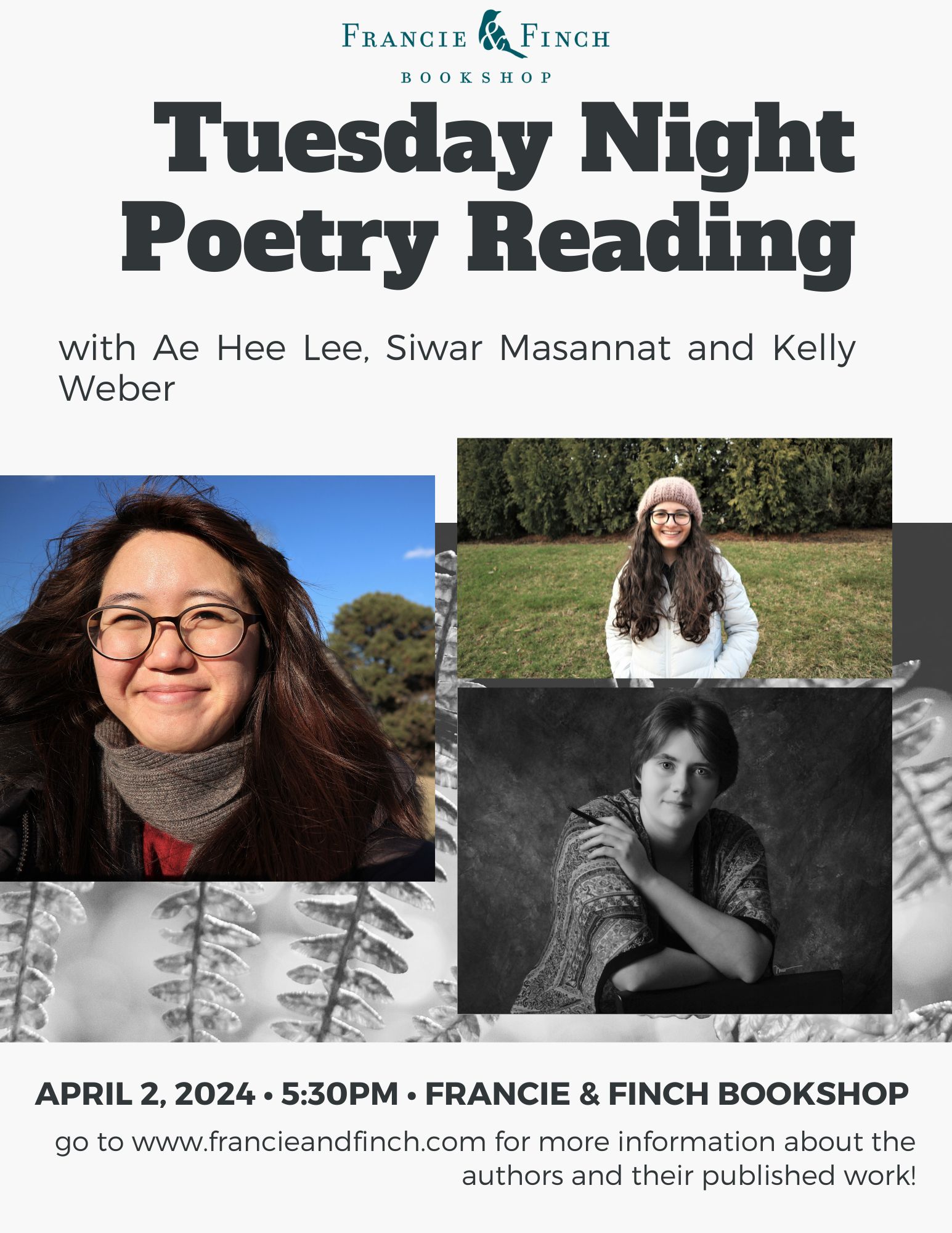
- This event has passed.
Poetry Reading with Ae Hee Lee, Siwar Masannat and Kelly Weber
April 2, 2024 @ 5:30 pm - 6:30 pm

Join us at F&F on Tuesday, April 2nd at 5:30 for an evening with Ae Hee Lee, Siwar Masannat, Kelly Weber!
About the Authors:
Ae Hee Lee – Born in South Korea and raised in Peru, Ae Hee Lee is the author of ASTERISM (Tupelo Press 2024), selected by John Murillo for the Dorset Prize, and the poetry chapbooks Bedtime || Riverbed, Dear Bear, and Connotary (Frost Place Chapbook Competition Winner – Bull City Press 2021). Her work has been published in Poetry Northwest, The Georgia Review, New England Review, and POETRY Magazine, among others. For more information visit aeheeleekim.com
Siwar Masannat is a Jordanian writer. Her debut collection of poetry, 50 Water Dreams, was selected by Ilya Kaminsky as the winner of the Cleveland State University Poetry Center’s First Book Competition and published in 2015. Managing editor of the African Poetry Book Fund and Prairie Schooner, Masannat currently works at the University of Nebraska in Lincoln. Most recently, Masannat’s writing has appeared in Bennington Review, Cordite Poetry Review, Jacket2, Mïtra: Revue d’art et de littérature, and 7iber, among several other publications.
Kelly Weber (they/she) is the author of We Are Changed to Deer at the Broken Place (Tupelo Press, 2022) and You Bury the Birds in My Pelvis, winner of the 2022 Omnidawn First/Second Book Prize (forthcoming December 2023). They have been nominated for the Pushcart Prize. Their work has appeared or is forthcoming in AGNI, Pleaides, Waxwing, Gulf Coast Online, Electric Literature’s The Commuter, Southeast Review, and elsewhere. She holds an MFA from Colorado State University. More of their work can be found at kellymweber.com.
About the Books:
ASTERISM by Lee – This book contemplates the wonders and challenges of transnational, polycentric living. Moving between South Korea, Peru, and the United States, the poems in the collection find luminous homes at the interstices of bridges, flight layovers, languages, desires, imperfect memories, and mutable mouths. They blur the line between self and other: words are translated into connotations, self-portraits become co-inhabited identities with family, friends, foods, and cultural histories. As ASTERISM interrogates capitalist enactments of fixed and exclusive belonging, each line seeks to unfurl towards a strangeness and beauty of its own making.
cue by Masannat – Jordanian poet considers the cultural nuances of the private-versus-public paradox. With cue, Siwar Masannat follows up her prize-winning debut with poems that wrestle with intimacy and distance. Departing from love as a force of creation, cue’s intertextual experiments and lyric poems map environmental relations and pose questions about privacy and visibility, love and family, gender, and ecological agency.
Masannat responds to artist Akram Zaatari’s excavation of studio portraits by Hashem El Madani. Captured between the 1940s and 1970s in the Lebanese town of Saida, El Madani’s photographs are living artifacts of a transnational modernity. They archive performances of gender and romance that seek to circumvent respectability politics. The private-public, then, emerges as a paradox at the heart of cue’s composition. The desire to commune with and re-transmit the photographs and their stories is accompanied by the speaker’s understanding of how visibility may be coopted and how privacy, at once essential and weaponized, is unevenly enjoyed, opportunistically deployed, and systematically encroached upon.
You Bury the Birds in My Pelvis by Weber – Poems in a range of forms that consider the queer body, chronic illness, and love amid rural plains landscapes. Set against a rural plains landscape of gas stations, wind, and roadkill bones littering the highways, You Bury the Birds in My Pelvis is a love letter to the nonbinary body as a site of both queer platonic intimacy and chronic illness. Looking at art and friendship, Kelly Weber’s poems imagine alternatives to x-rays, pathologizing medical settings, and other forms of harm. Considering the meeting place of radiological light and sunlit meadows, the asexual speaker’s body, and fox skeletons, these poems imagine possible forms of love. With the body caught in medical crisis and ecological catastrophe, Weber questions how to create a poetry fashioned both despite and out of endings.
You Bury the Birds in My Pelvis explores forms with plainspoken prose poems with a mix of short poems and longer lyric sections that navigate insurance systems and complicated rural relationships to queerness.
You Bury the Birds in My Pelvis is the winner of the 2022 Omnidawn 1st/2nd Poetry Book Contest, chosen by Mary Jo Bang.
